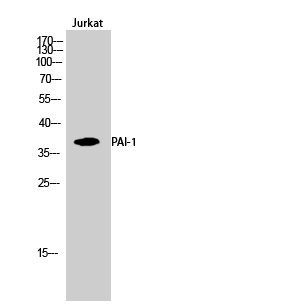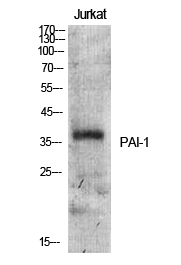

| WB | 咨询技术 | Human,Mouse,Rat |
| IF | 咨询技术 | Human,Mouse,Rat |
| IHC | 1/100-1/300 | Human,Mouse,Rat |
| ICC | 技术咨询 | Human,Mouse,Rat |
| FCM | 咨询技术 | Human,Mouse,Rat |
| Elisa | 1/20000 | Human,Mouse,Rat |
| Aliases | SERPINE1; PAI1; PLANH1; Plasminogen activator inhibitor 1; PAI; PAI-1; Endothelial plasminogen activator inhibitor; Serpin E1 |
| Entrez GeneID | 5054; |
| WB Predicted band size | 37kDa |
| Host/Isotype | Rabbit IgG |
| Antibody Type | Primary antibody |
| Storage | Store at 4°C short term. Aliquot and store at -20°C long term. Avoid freeze/thaw cycles. |
| Species Reactivity | Human,Mouse,Rat |
| Immunogen | Synthesized peptide derived from the Internal region of human PAI-1. |
| Formulation | Purified antibody in PBS with 0.05% sodium azide,0.5%BSA and 50% glycerol. |
+ +
以下是3篇关于PAI-1抗体的代表性文献概览(信息基于公开研究数据整理,非实时更新):
1. **文献名称**:*"A monoclonal antibody targeting PAI-1 inhibits tumor angiogenesis and growth"*
**作者**:Bajou K. et al.
**摘要**:研究报道了一种靶向PAI-1的单克隆抗体,通过抑制PAI-1与玻连蛋白(vitronectin)的相互作用,阻断了肿瘤微环境中血管生成,并在小鼠模型中显著抑制了乳腺癌和黑色素瘤的生长。
2. **文献名称**:*"PAI-1-specific antibody therapy attenuates vascular thrombosis in a murine model"*
**作者**:Zhu Y. et al.
**摘要**:该研究开发了一种人源化PAI-1中和抗体,在血栓形成小鼠模型中验证了其通过抑制PAI-1的纤溶抑制作用,显著减少动脉血栓面积并改善血流恢复,为抗血栓治疗提供了新策略。
3. **文献名称**:*"Neutralization of PAI-1 improves insulin sensitivity in metabolic syndrome via adipose tissue remodeling"*
**作者**:Crandall J.P. et al.
**摘要**:研究发现使用PAI-1中和抗体可减少肥胖小鼠脂肪组织纤维化和炎症,改善胰岛素抵抗,提示靶向PAI-1可能成为代谢综合征的潜在治疗手段。
4. **文献名称**:*"Epitope mapping of PAI-1 antibodies reveals differential effects on its interaction with uPA and vitronectin"*
**作者**:Gils A. et al.
**摘要**:通过表位定位分析不同PAI-1抗体的结合区域,揭示了抗体对PAI-1与尿激酶型纤溶酶原激活物(uPA)及玻连蛋白结合的差异性抑制机制,为开发特异性检测或治疗工具提供理论依据。
注:以上为示例性内容,实际文献需通过PubMed或Web of Science等平台检索确认最新进展。
**Background of PAI-1 Antibodies**
Plasminogen activator inhibitor-1 (PAI-1), a member of the serine protease inhibitor (serpin) family, is a key regulator of fibrinolysis and extracellular matrix (ECM) remodeling. It primarily inhibits tissue-type (tPA) and urokinase-type (uPA) plasminogen activators, thereby controlling plasmin generation and proteolytic activity. Elevated PAI-1 levels are associated with thrombotic disorders, fibrosis, metabolic syndrome, and cancer progression, making it a critical biomarker and therapeutic target.
PAI-1 antibodies are essential tools for detecting and quantifying PAI-1 in biological samples. They are widely used in research to study PAI-1's role in diseases, its interaction with cofactors (e.g., vitronectin), and its structural dynamics (e.g., active vs. latent conformations). Both monoclonal and polyclonal antibodies are available, with monoclonal antibodies offering high specificity for epitopes in active, latent, or complexed forms of PAI-1.
Applications include Western blotting, ELISA, immunohistochemistry, and functional assays to assess PAI-1 activity or inhibition. Therapeutic PAI-1-neutralizing antibodies are also under investigation to counteract excessive PAI-1 activity in fibrosis or thrombosis. Challenges remain in ensuring antibody specificity due to structural similarities among serpins and PAI-1's conformational variability. Nonetheless, PAI-1 antibodies continue to advance both basic research and clinical diagnostics in fibrinolysis-related pathologies.
×